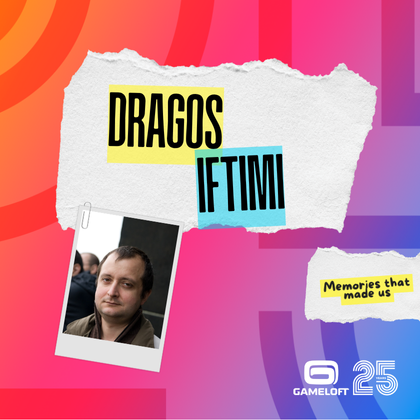Every great journey starts with great people, and ours began 25 years ago.
As part of our 25th anniversary celebrations, we’re interviewing some of the people who helped shape Gameloft into what it is today.
We spoke with Martyn Honeyford, lead engine & online engineer at Gameloft Brisbane, about what he was doing at 25, what gaming means to him, and his journey into the industry.
Where were you at 25?
I was living in the UK (where I grew up) working for IBM at a huge site with over 3,000 employees. It was my first job out of university (where I studied computer science), and I was working primarily in C on a large middleware product across a huge range of platforms from PC to Unix to mainframes. It definitely felt like I was thrown in at the deep end, but I think it gave me a really good grounding in both problem solving and dealing with customers.
What were you playing at 25?
I was playing a lot of PlayStation, Sega Saturn, Nintendo 64, and Sega Dreamcast (which was released in Europe on my 25th birthday!). Specific games would have been The Legend of Zelda: Ocarina of Time, Soulcalibur, Sega Rally, Virtual Cop, and Tekken 3.
Why gaming?
Whilst I have generally found challenge and interest in all of the professional roles I have had, I have found working in games to be the nexus of difficult technical challenges, passionate teams, immediate feedback, and opportunity for contribution. Making (good) games is hard, but it helps that, generally speaking, people work in games because they want to be there and are passionate about the work. This has not always been my experience in other industries. You also can't beat the tight feedback loop of making changes or implementing new features and seeing them come to life on the screen immediately. Working here at Gameloft, I have found that everyone working on a title has an important part to play and can make a difference. There is no feeling of being a small cog in a big machine that I have found in other roles.
Most important advice?
Always be clear on the "why" of any situation. It is very easy to get caught up in the "what" and "how" of any task and lose track of the "why." I have found that a good portion of issues arise when you don't take the time to ensure that everyone (including yourself) is clear on why you are doing something. For instance: what problem are you trying to solve? Why are you trying to make this specific process faster, how will that help overall, etc. Keeping the “why” front of mind is especially valuable when problems arise and you must change your approach. If you lose track of the “why”, you can end up blindly continuing on wild-goose chases that don't address your original goals. Similarly, when mentoring staff members, I always try to explain why something was done the way it was, rather than just what was done. Other than this, you can't go wrong with the classic "treat everyone the same way you would like to be treated.”
Favorite genre?
I've always been a bit fan of platformers and metroidvanias. I was hooked after playing Manic Miner on the Sinclair ZX Spectrum home computer in the ’80s. Highlights are Super Mario World, Castlevania: Symphony of the Night, Super Meat Boy, Celeste, and Hollow Knight.
What do games mean to you?
Video games have always been my go-to way to unwind and connect with friends. They are also a shared passion in my household and a wonderful way to spend quality time with my family. We spend a lot of our spare time playing video, board, and tabletop games, and both my children are keen gamers.
Favorite game?
My favorite game of all time is Super Mario World for the SNES. It was a perfect mix of tight, intuitive controls that always felt fair—if you messed up, it was always your own fault. It was mind blowing at the time trying to find all the hidden levels. In recent years, the most playtime in our house has been dedicated to four-player games of FIFA and Boomerang Fu.



